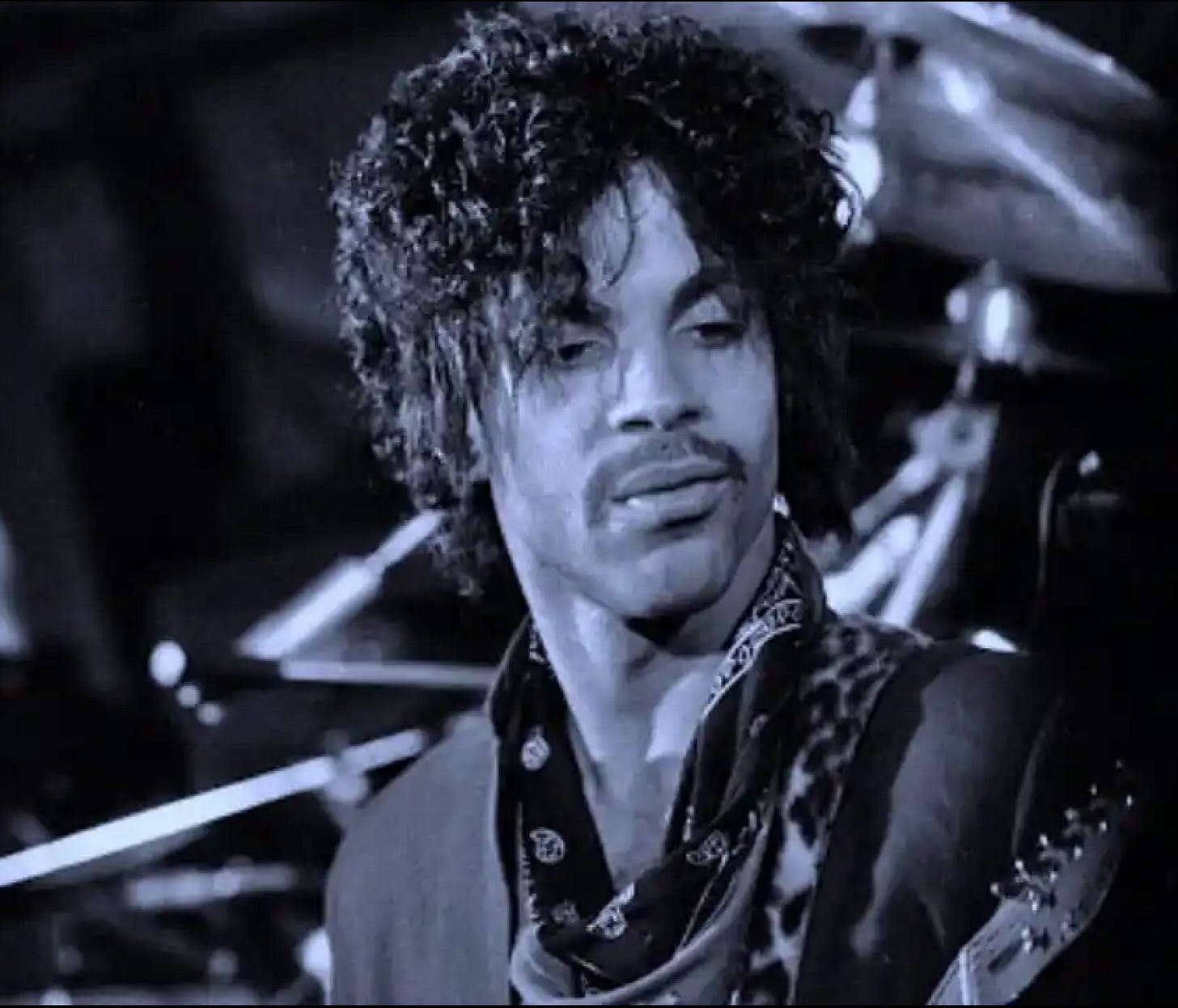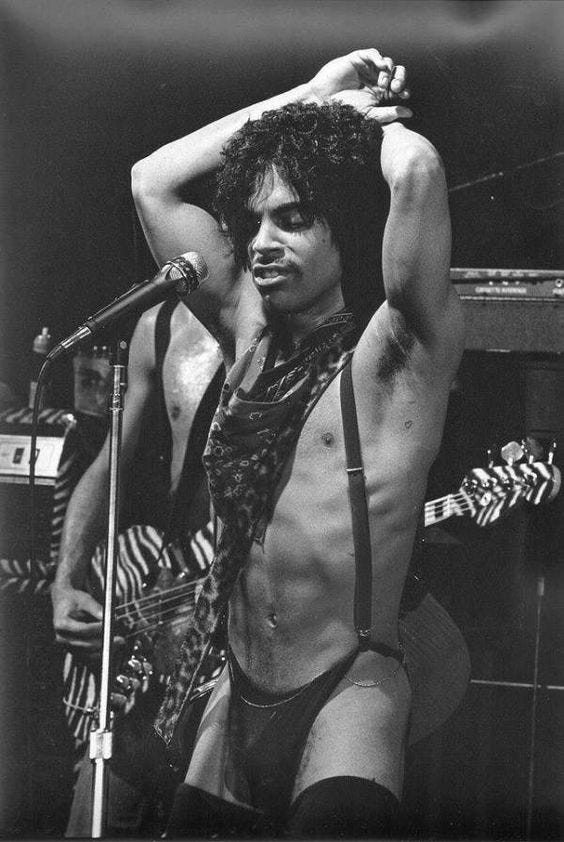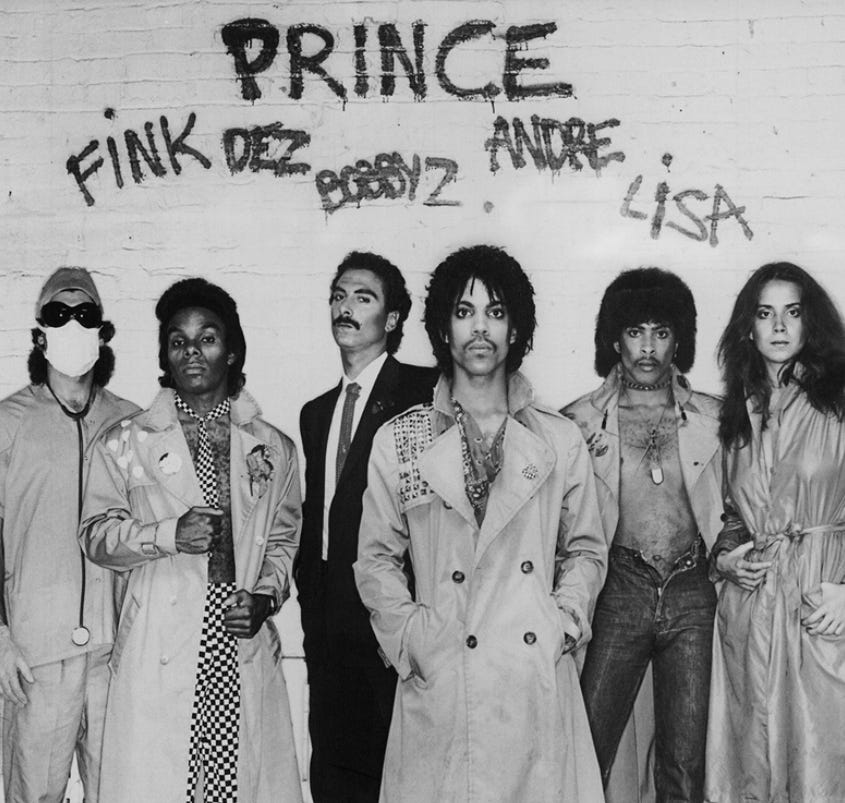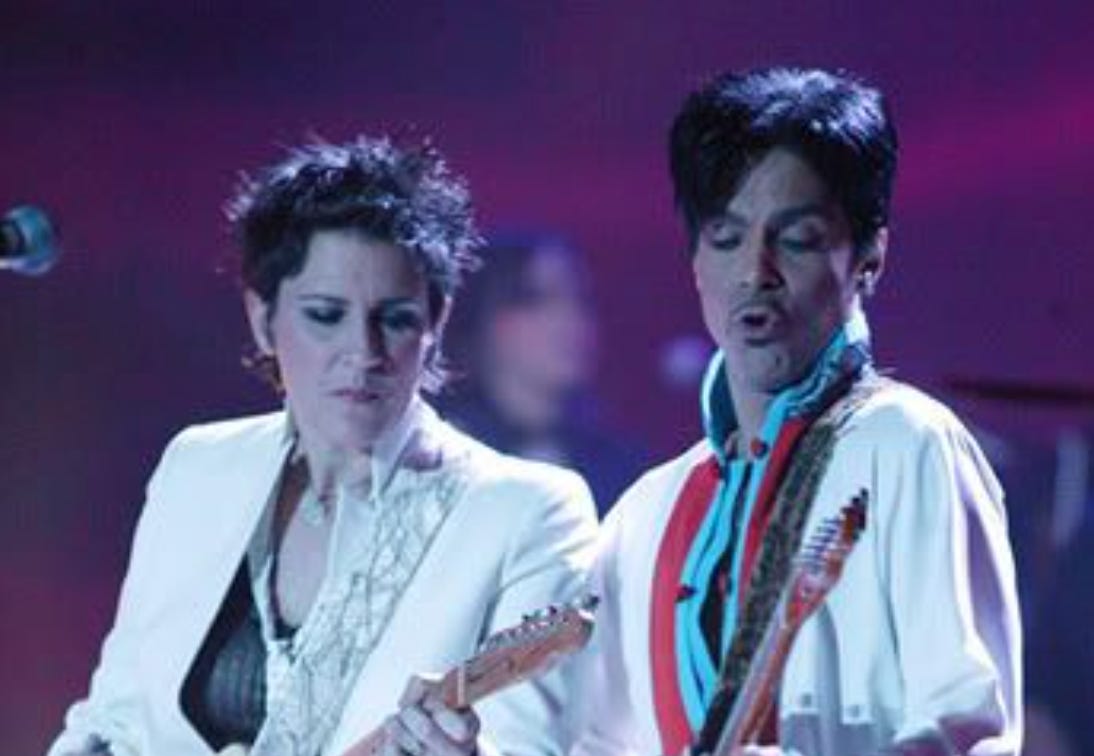"Uptown" - Prince
On How to Start a Revolution
Prince taught us that you have to dream it before you can build it.
Once upon a time in a far-off land, there was a city called Minneapolis. Unlike in America, trappings of racism, homophobia, and patriarchy didn’t exist here. Conformity was a drag — and not the fun kind. Uptown was the crown jewel of this perfect society, and people would set forth on a holy expedition, presumably from Downtown, to be freed from the prison walls of bigotry.
This was the utopia Prince tried building in 1980 with his single “Uptown.” He’d be sorely disappointed today by how much we’ve missed the mark.
The song begins with Prince on his way back home to Uptown. He knows better than to talk to strangers outside of his utopian bubble because, inevitably, someone’s gonna stir up some shit. He’s stopped anyway by an attractive woman.
What’s up little girl?
I ain’t got time to play
Baby didn’t say too much,
She said, “Are you gay?”
Oh here we go. Just because he’s wearing nothing but thong underwear, leggings, and a trench coat, she has to automatically assume Prince is gay?
That took me by surprise. I didn’t know what to do.
I just looked her in her eyes,
And I said - “No. Are you?”
This bullshit conversation would never happen in Uptown.
She’s just a victim of society and all of its games.
Now where I come from,
we don’t let society tell us how it’s supposed to be
Our clothes, our hair, we don’t care
It’s all about being there
The confused girl is invited Uptown where she can “set her mind free.” When they arrive, people from all races and ethnic backgrounds are dancing together in the streets. This goes on all night, every single night. People aren’t separated by race, and they don’t make narrow-minded judgments of one another. There are no police officers breaking up the party. The only law here is complete harmonious freedom. The woman is liberated from her shackles. Sex ensues.
“Uptown” was written as a musical love letter to Prince’s childhood growing up in Minneapolis. He attended grade school in the neighborhood and spent nights hanging out there with friends and bandmates. Although the real Uptown was considered a bohemian meeting place for artists, it was far from the idyllic home described in Prince’s song. He told Rolling Stone in 1980 that he and his friends “took a lot of heat all the time. People would say something about our clothes or the way we looked or who we were with, and we’d end up fighting.” He added: “I was a very good fighter… I never lost. I don’t know if I fight fair, but I go for it. That’s what ‘Uptown’ is about – we do whatever we want, and those who cannot deal with it have a problem within themselves.”
“Uptown” was one of Prince’s earliest efforts to integrate political statements into his music. Here, he is urging listeners to “go Uptown” — to subscribe to this concept of a discrimination-free world. On his 1981 follow-up album Controversy, Prince addresses the threat of nuclear war in “Ronnie Talk to Russia.” In 1987, he laments over poverty, drug abuse, and the AIDS crisis in “Sign o’ the Times.” In 2009’s “Dreamer,” he addresses racial inequity as he channels Dr. Martin Luther King Jr.
Prince couldn’t manifest a real-life utopia simply by dreaming about it. So he’d quite literally need to start a Revolution. He’d go on to assemble a band that mirrored his vision of a more equitable world and selected bandmates who were both Black and white, men and women, straight and gay.
He would also work quietly throughout his career with organizations rallying around climate justice, youth education, and racial equity. He funded organizations such as Green for All, a nonprofit dedicated to creating green jobs in underserved and underrepresented communities, and he helped launch and fund #YesWeCode, a nonprofit organization encouraging Black youth to pursue careers in technology. Prince was also a supporter of the Black Lives Matter movement. He privately sent money to the family of Trayvon Martin, a teenager killed by George Zimmerman. News of his secret donations became public only after Prince's passing in 2016.
Instead of the prejudice-free fantasy that he imagined as a young man, Prince’s beloved Uptown neighborhood became the gruesome opposite. In 2020, less than 3 miles away from the epicenter of Uptown, George Floyd was brutally attacked and murdered by former police officer Derek Chauvin. Less than a year later, Nicholas Kraus was convicted of second-degree murder after ramming his Jeep into an Uptown crowd of BLM protestors, killing one.
Among the last songs Prince recorded was 2015’s “Baltimore,” a tribute to Freddie Gray, the 25-year-old Black man who died under suspicious circumstances while in Baltimore Police custody.
Nobody got in nobody’s way
So I guess you could say it was a good day
At least a little better than the day in Baltimore
Does anybody hear us pray
For Michael Brown or Freddie Gray?
Peace is more than the absence of war
Prince didn’t always live up to the image of the open-minded model citizen described in “Uptown.” After becoming a Jehovah’s Witness in the early 2000’s, many found his new-found faith at odds with his inclusive image. Former Revolution guitarist Wendy Melvoin told the Minneapolis Star Tribune in 2004 that he declined a reunion tour “because of my homosexuality and the fact that I’m half Jewish.” Prince would later have a change of heart and reunite with Melvoin and former bandmate (and partner to Melvoin) Lisa Coleman several times throughout the end of his career.
Prince’s efforts to build a more utopian world were cut short when he passed away, though he always expected new generations would carry forward the mantle. “The system is broken,” Prince said during an impassioned speech at 2015’s Rally 4 Peace concert. “It's going to take the young people to fix it this time. We need new ideas, new life.”
Prince may be gone but he left behind a template for how to start a revolution. Begin by imagining how a new reality could look. Picture this new reality in such vivid detail that a song could be written about it. John Lennon used this method famously when he wrote “Imagine.” Once the vision is beautifully clear, then — and this step is important — make sure every action taken in the real world is in service to the vision. It’s not enough to dream of a better world. We have to be willing to work tirelessly to achieve it. Dream it. But also build it.
It ain't about no downtown
Nowhere bound
Narrow-minded drag
It's all about being free
Everybody's going Uptown
It's where I wanna be
Uptown
U can set your mind free
If you enjoy this weekly newsletter, please consider upgrading to a paid subscription. As a thank you gift, you’ll receive a coffee mug of your choice from our merch store.
And check out the Songs That Saved Your Life radio show! You can listen live every Monday from 11am-12pm EST or access the archives at any time
Did you catch last week’s issue?







Love every word of this! The song works at so many levels - dispelling stereotypes and attacking racism & homophobia through the story of a date with a stranger and one hell of a party. All wrapped in those super funky keys by Dr. Fink! I discovered Dirty Mind in 1988 and this song was my go to when I needed a break from the petty cruelty I witnessed in high school and I wanted to dream of a better world. I’m so glad you put the song in a larger context too, both Prince’s career and U.S. society at large. Great piece!
Fantastic piece, Jami. I’ve been waiting for another Prince essay! I’m not sure if there was another death of a musician (to be extremely reductionist) that hit me harder. I still haven’t processed it. “Uptown” is the perfect song to explore Prince’s utopian vision.